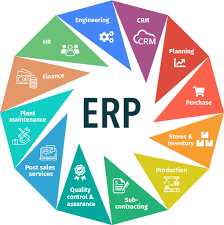With the growing manufacturing industry, an ERP system has arguably become an integral part of any manufacturing operation. This system is powerful enough to connect every function with the manufacturing organization while providing all required data to run the business productively and profitably. An ERP software can manage and monitor all crucial functions, from handling customer orders and customer relationships to purchasing, inventory management, accounting, and production.
If your current ERP platform is incapable of doing any of the above or not working efficiently, consider upgrading it. Understandably, choosing the right erp for manufacturing industry from multiple ERP options can be a tough task. This article will guide you through 7 key steps to make selecting the right ERP system for manufacturing companies easier.
Step 1: Identify the Problems
The first step is about identifying the problems you want to solve. For instance, you might record inventory-related details on spreadsheets and manually transfer data to the accounting system.
It’s a relatively time-consuming and error-prone task and involves the unproductive use of employees who could add value to another crucial manufacturing operation. Implementing an ERP solution for integrating inventory and accounting is an excellent solution for this problem. Review all your business processes and see if automation could improve them.
Step 2: Make sure the ERP System if Future-Proofed
Now that ERP is the core infrastructure of manufacturing companies, it needs to be resilient enough to grow with the business. Therefore, always search for flexible, open, and modular software that can integrate well with other systems.
Step 3: Look for the Easy-to-Use and Mobile-Friendly System
Several workers use a manufacturing ERP system from the shop floor to the top floor. The system’s interface needs to be logically structured and intuitive to use. Installing an ERP platform with a well-designed interface will increase employee satisfaction and productivity. In addition to a user-friendly interface, an ERP system should also offer easy mobile access.
Is the mobile access all about linking to a desktop web browser, or is it an application built from scratch and designed to complement the desktop version? You should look for the latter one. Having staff as productive on smartphones and tablets as on desktops will improve the efficiency of manufacturing operations.
Step 4: Select the Deployment Option Wisely
You can opt for on-site, cloud, or hybrid deployment solutions when it comes to implementing the ERP system in the manufacturing organization. In this technologically advanced world, cloud solutions have matured to the point where their perks outweigh those an on-site solution offers.
For instance, cloud-based ERP systems operate on a pay-as-you-go scenario which minimizes the upfront cost, and IT staff overhead will also be minimal.
Step 5: Verify the Training and Support Options Provided by Vendor
Always remember there is no point in investing time and resources into implementing an upgraded ERP system if your staff doesn’t know how to use it. Choosing a vendor who can train a handful of key personnel throughout the manufacturing organization is recommended. Moreover, develop a training schedule with the selected vendor and prepare your staff for efficient ERP system usage.
Step 6: Check if Vendor Understands Your Business
Don’t partner with the vendor who overwhelms you with tech jargon while selling the benefits of his ERP solution. Working with a vendor who understands manufacturing companies’ challenges and the problems you are trying to solve is advisable.
Step 7: Make Your Decision
Before making a final decision, evaluate the potential hidden expenses in ERP implementation, negotiate the price with the vendor, sign the contract, and finally estimate the go-live date.
Final Thoughts!
Defining the ERP selection criteria before embarking on the selection journey can make it easier to choose the right system. Keep in mind to select an end-to-end manufacturing ERP that can combine financial management, CRM, supply chain management, and industry-specific solutions in a single seamless system. Such solutions are flexible enough to give your manufacturing company the foundation to scale and compete in a digitally advanced world.
In addition, to manufacturing modules and functions, consider the reputation, experience, and professionalism of the ERP vendor. The vendor should be capable of offering customized ERP systems tailored according to the company’s requirements and training to in-house staff for efficient use of the software.
Also Read – Best ERP for Construction Industry
